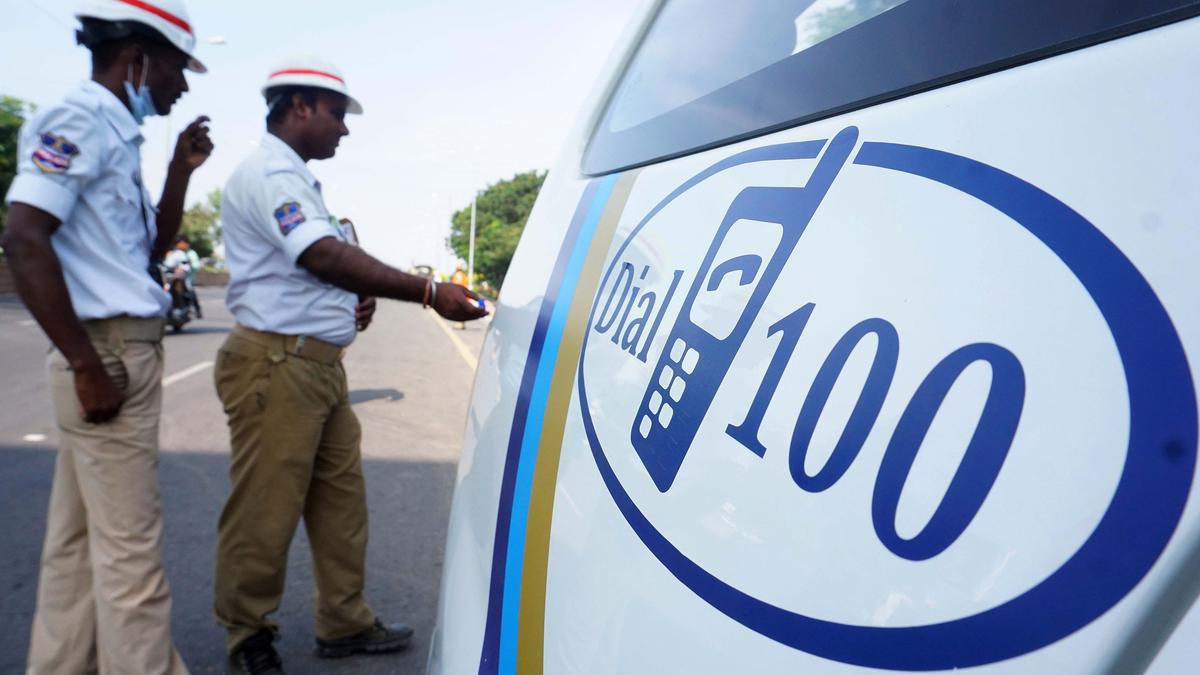
While citizens raised issues with Dial 100 emergency helpline response time, police and Hyderabad and Cyberabad police commissionerates said that the response time has improved. The image is used for representative purposes only.
| Photo Credit:
In recent months, citizens across Telangana have taken to social media to voice concerns about the Dial 100 emergency helpline — highlighting issues such as delays in response, calls going unanswered, and confusion around caller locations. Whether it’s road accidents, street brawls, harassment, or even noise complaints, the common question surfacing online is: Is help arriving fast enough?
An X user said, “When even Dial 100 doesn’t respond what if we are really in an emergency?”
Responding to a thread about the same issue, another user said, “…. I couldn’t place an emergency call 100, reason ?? Failed to get support from police even after convincing so much on phone thru some other number.” The user also shared screenshots of repeated unanswered calls.
Mobile tower’s role in response time
Meanwhile, Parimala Hana Nutan, Joint Commissioner of Police (Administration and Coordination), Hyderabad said that the department attends to every single Dial 100 call that comes their way. “Our average response time in Hyderabad city is about six minutes. In rural areas, it’s a little longer — 10 to 12 minutes, mainly due to the distance between the mobile tower and the caller’s actual location.”
This marks nearly a 50% reduction in response time compared to the same period last year, when the average peaked at 13 minutes during the April–June quarter. In 2024, the Hyderabad commissionerate handled 2,98,511 calls, maintaining an average response time of 6.25 minutes, according to official data.
Challenges in rural areas
Explaining the challenges in rural areas, Ms. Nutan said, “The nearest mobile tower could be 2 to 5 kilometres away from the caller. Even after the patrol vehicle reaches that spot, it may still need to travel another 500 metres to a kilometre to get to the exact location. But we make every effort to respond swiftly.”
8,000 calls a day in Hyderabad
While the system receives calls running into lakhs, Hyderabad city police filter out spam and non-actionable calls to focus on real-time emergencies. “We answer nearly 8,000 calls every day,” Ms. Nutan added. “In many instances, issues are resolved over the phone itself, without needing a field response. Still, we register around 150 to 200 FIRs daily based on these emergency calls.”
Around 1,000 calls a day in Cyberabad
In Cyberabad, the IT hub of the city, where call volumes are relatively lower, authorities are working on the response efficiency. “Our average response time used to be around 20 minutes. We’ve now reduced that to 10 to 12 minutes. We receive 800 to 1,000 calls a day,” said B. Sai Sri, DCP, Cyberabad Special Branch. “We have mapped high-density zones like Attapur, Mailardevapally, Petbasheerabad, Jeedimetla, and Suraram, which contribute to most of these calls. Based on this data, we have ramped up resources in these zones to ensure quicker response times.”
To meet demand, Cyberabad police have assigned two teams per police station, especially during peak hours in the evenings, when call volumes typically spike. In the Rachakonda commissionerate, which received 2,41,742 calls in 2024, the average response time stood at 8.37 minutes.
Addressing common citizen concerns about dropped calls or prioritisation, DCP Sai Sri clarified: “The system operates on a first-come, first-served basis with no manual intervention. Moreover, Dial 100 for Telangana is managed by an outsourced agency in a call centre format. So any issue of calls not getting through isn’t directly visible to us until the information is passed on.”
Frustration over initial few seconds
Many callers also express frustration that the initial few seconds of each call go into verifying personal details and location. “If the caller’s GPS is enabled, the system auto-detects the location. But cell tower data alone is often inaccurate, so in most cases, we call back to confirm the exact location,” Ms Sai Sri said.
Officials say backend operations are continuously evolving to meet public expectations. Daily Situation Reports (DSRs) are submitted to the Director General of Police (DGP) and reviewed for performance gaps. Deployments are tweaked in real time based on area-wise call patterns and timings.
Published – May 03, 2025 12:23 pm IST
Anurag Dhole is a seasoned journalist and content writer with a passion for delivering timely, accurate, and engaging stories. With over 8 years of experience in digital media, she covers a wide range of topics—from breaking news and politics to business insights and cultural trends. Jane's writing style blends clarity with depth, aiming to inform and inspire readers in a fast-paced media landscape. When she’s not chasing stories, she’s likely reading investigative features or exploring local cafés for her next writing spot.




